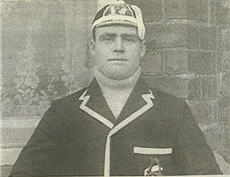Rugby league career
On his return to Australia, he joined the fledgling code of rugby league along with 13 of his Olympic teammates. He played at full-back in the first Test against Great Britain in 1910 when Australia hosted the tourists. He was selected in 1911 for the 2nd Kangaroo tour of Great Britain and played in 24 tour matches, scoring 9 tries. He played on the wing in the victorious 1st and 2nd Tests of 1911.
During the 1910 Great Britain Lions tour of Australia and New Zealand, the first ever, Russell made his international league début in the first Test in Sydney on 18 June. Four of his former Wallaby teammates also debuted that day John Barnett, Bob Craig, Jack Hickey and Chris McKivat - making them collectively Australia's 11th to 15th dual code internationals. This repeated a similar occurrence two years earlier when five former Wallabies in Micky Dore, Dally Messenger, Denis Lutge, Doug McLean snr and John Rosewell all debuted for the Kangaroos in the first ever Test against New Zealand.
His club football was with Newtown, where he played for 7 seasons. He was captain-coach of the Newtown premiership-winning side of 1910, landing two goals to tie the final against South Sydney 4-4, thus enabling Newtown to win the premiership.
Russell was also selected for the 1911–12 Kangaroo tour of Great Britain.
Post playing
Russell coached Newtown for a number of years, including the premiership winning team of 1933. He was a graded referee and served as an Australian rugby league selector for a number of years.
Charles Russell was awarded Life Membership of the New South Wales Rugby League in 1944. [3] In 2008, the centenary year of rugby league in Australia, Russell was named in the Newtown Jets 18-man team of the century.
This page is based on this
Wikipedia article Text is available under the
CC BY-SA 4.0 license; additional terms may apply.
Images, videos and audio are available under their respective licenses.


